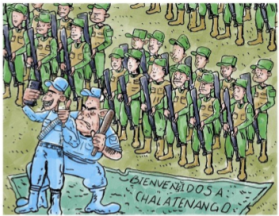Remembering the Jesuits
El Salvador recently commemorated 32 years since U.S.-trained military assassinated six Jesuit priests, their housekeeper, and her daughter at the University of Central America (UCA) on November 16, 1989.
As journalist Hilary Goodfriend wrote previously, “the massacre remains emblematic of the indiscriminate savagery exercised by the servants of the Salvadoran ruling class, the impunity they enjoy, and the devastating legacies of US intervention in the region.” Notably, of the twenty-five military officers found to have been involved in the murders, nineteen of them were trained at the School of the Americas, the United States military training academy for Latin America, now known as the Western Hemisphere Institute for Security Cooperation (WHINSEC).
Several years before his murder, Father Ignacio Ellacuría, student of liberation theology, rector at the UCA, and strong advocate for peace negotiations during the war, asked the following: “History shows that Yankee intervention, far from favoring the peoples of Latin America, far from promoting their democratic self-determination, has put them in the position that so many find themselves in today, by favoring genocidal antidemocratic regimes … and by allying with oligarchic sectors that have maintained the underdevelopment and exploitation of the vast Latin American majorities … How many thousands will have to flee their homelands or simply be displaced from their homes and workplaces, which American weapons have now turned into places of death and destruction?”
The UCA has remained steadfast in its quest to seek justice for the victims, though met a major roadblock last September, when the Criminal Chamber of the Supreme Court annulled the case against the intellectual authors, or those accused of orchestrating the assassinations, including high-ranking military officials and former president, Alfredo Cristiani (1989-1994).
On the morning of the anniversary, El Salvador’s de facto Attorney General, Rodolfo Delgado, whom legislators from President Bukele’s New Ideas party illegally installed in May, presented an appeal to the new Supreme Court, tweeting, “Today, we take up the path toward true justice, removing judicial obstacles that for 32 years have impeded the victims from knowing the truth.” There was no consultation with the UCA or with the families of the victims, however, who have been calling on the state to seek forgiveness, as the government of El Salvador did in 2012 for the 1981 El Mozote massacre.
The Constitutional Chamber of the Supreme Court, whose magistrates were also illegally elected, agreed to hear the case on November 25, declaring null and void the Criminal Chamber's previous annulment.
While the appeal is welcome, it does raise questions as to the motivation, given that Bukele and his party have on previous occasions acted to block truth and justice processes, including denying access to military records regarding the El Mozote massacre and passing an outlandish reform that removed the judge overseeing the trial. In addition to trying to win political points by responding to a legitimate cry for justice from the population - and painting itself as fighting for truth and justice - the move may also be meant as power play to target political opponents in the ARENA party, several of whom are implicated in the case.
Furthermore, the UCA itself, whose tireless call for justice it would appear Delgado is now taking up, has been under attack from the Bukele administration for its criticism of human rights violations, acts of repression, and consolidation of power in Bukele's hands, not unlike the denouncements made by the Jesuits over thirty years ago before they were murdered.
In the face of steep obstacles, however, the tenacity and vision of the grassroots movements for human rights in El Salvador remain an inspiration worldwide. Key to their struggle is being rooted in the practice of guarding, cultivating and sharing historical memory, not only through annual commemorations, but through also art, poetry, music and education.
As José Maria Tojeira, director of the Human Rights Institute at the UCA (IDHUCA) wrote to mark the occasion, “Remembering is not missing… Nor is creating memory just repeating dates and facts. Memory, when it is authentic, is always a form of reflection that leads to commitment. Memory is identifying with the reasoning to live a life in search of justice and solidarity. Having [our martyrs] present today is reviving their ideas in ourselves and draw energy to apply them to the new historical circumstances in which we live today. The rage and pain of missing becomes commitment and work to ensure that history of those who gave their lives does not remain unfinished.”
¡Ignacio Ellacuría, presente! ¡Ignacio Martín-Baró, presente! ¡Segundo Montes, presente! ¡Amando López, presente! ¡Joaquin López y López, presente! ¡Juan Ramón Moreno, presente! ¡Elba Ramos, presente! ¡Celina Ramos, presente!
Watch a commemorative mass held at the UCA here, including a brief reflection from Father Jon Sobrino, and see photos here

 "I am a CISPES supporter because continuing to fight for social justice and a more people-centered country means continuing the dream and sacrifice of thousands of my fellow Salvadorans who died for that vision.” - Padre Carlos, New York City
"I am a CISPES supporter because continuing to fight for social justice and a more people-centered country means continuing the dream and sacrifice of thousands of my fellow Salvadorans who died for that vision.” - Padre Carlos, New York City

